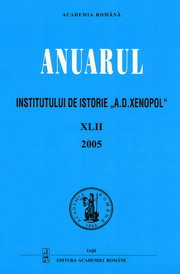„IAȘII SUB CUȚITUL HAHAMULUI”. ANTISEMITISM ECONOMIC ÎN PROHIBIȚIA CĂRNII TRIF (1867−1868)
“IAȘI UNDER THE HAKHAM’S KNIFE”. ECONOMIC ANTI-SEMITISM IN THE PROHIBITION OF TREIF MEAT (1867−1868)
Author(s): Mihai ChiperSubject(s): History, Jewish studies
Published by: Editura Academiei Române
Keywords: economic anti-Semitism; kosher kitchen; hakham; free competition; prohibition
Summary/Abstract: The present study is a page of economic micro-history of the city of Iași, focused on one of the most acute problems in the public agenda: the control of the beef market by the Jewish traders. The prohibition of the treif and kosher meat – the latter generically called in those days “passed through the hakham’s knife” –, an economic and social experiment implemented in Iași over a period of 10 months between 1867 and 1868, was the result of the decisions made by the local authorities under the pressure of the Romanian bourgeoisie. From a larger perspective, this action marked the enforcement of the idea of economic nationalism, which aimed, among other things, at taking the control from the hands of the Jewish entrepreneurs. By using the anti-Semitism entailed by the ritual of the kosher kitchen, prescribing differences in the food area and inevitably raising social, cultural and political barriers between the Jews and the non-Jews, the local authorities inflicted heavy losses to the Jewish businesses. Mainly, these dealt with the reorganization of the market on anti-competitive bases, laying on a legislation that represented a combined form of boycott, prohibition and segregation of consumption, on ethnic and religious criteria. From the perspective of the local officials, Romanians could not be humbled by being given a product that the Jews deemed inferior and impure (the treif meat), a fact established under the decisions of the city council of Iași. The results of the prohibition had a major impact upon the financial status of both the Romanian and the Israeli communities, leading to an artificial food crisis and to a social revolt situation. Forced by a powerful economic failure, the authorities gave up the anti-Semite economic policies, going back to the principles of free competition.
Journal: Anuarul Institutului de Istorie »A.D. Xenopol« - Iaşi
- Issue Year: LII/2015
- Issue No: 52
- Page Range: 245-268
- Page Count: 23
- Language: Romanian

